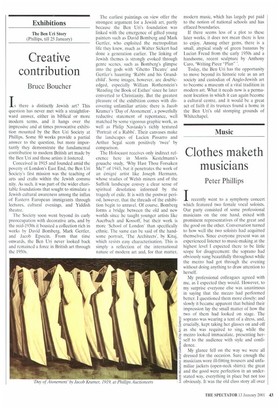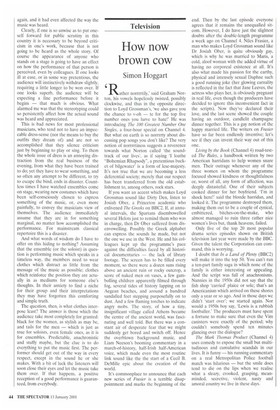Music
Clothes maketh musicians
Peter Phillips
Irecently went to a symphony concert which featured two female vocal soloists. Our party consisted of some professional musicians on the one hand, mixed with prominent representatives of the great and the good on the other. Conversation turned to how well the two soloists had acquitted themselves. Since everyone present was an experienced listener to music-making at the highest level I expected there to be little scope for disagreement: the soprano had obviously sung beautifully throughout while the mezzo had got through the evening without doing anything to draw attention to herself.
My professional colleagues agreed with me, as I expected they would. However, to my surprise everyone else was unanimous in saying that the mezzo had performed better. I questioned them more closely: and slowly it became apparent that behind their impression lay the small matter of how the two of them had looked on stage. The
▪ soprano was wearing a tent of a dress, and, .92
a crucially, kept taking her glasses on and off as she was required to sing, while the 6,. mezzo looked immaculate, presenting her • ;-,, self to the audience with style and confitdence.
'76 My glance fell on the way we were all 0 -F„ dressed for the occasion. Sure enough the
,,. musicians wore ill-fitting trousers and unfamiliar jackets (open-neck shirts); the great and the good were perfection in an understated way, everything in place but not too III obviously. It was the old class story all over again, and it had even affected the way the music was heard.
Clearly, if one is so unwise as to put oneself forward for public scrutiny in this country it is necessary to be beyond criticism in one's work, because that is not going to be heard as the whole story. Of course the appearance of anyone who stands on a stage is going to have an effect on how the performance of that person is perceived, even by colleagues. If one looks ill at ease, or in some way pretentious, the audience will instinctively withdraw slightly, requiring a little longer to be won over. If one looks superb, the audience will be expecting a fine performance before it begins — that much is obvious. What alarmed me was that the stereotyping could so persistently affect how the actual sound was heard and appreciated.
This is bad news for most professional musicians, who tend not to have an impeccable dress-sense (nor the means to buy the outfits they dream of) and are not so accomplished that they silence criticism just by beginning to play or sing. To them the whole issue of dress is an annoying distraction from the real business of the evening, from what they have been trained to do; yet they have to wear something, and so often any attempt to be different, to try to escape the bind, ends in disaster. Countless times I have watched ensembles come on stage, wearing new costumes which have been self-consciously chosen to express something of the music, or, even more painfully, to convey the musicians view of themselves. The audience immediately assume that they are in for something marginal, no matter how accomplished the performance. For mainstream classical repertoire this is a disaster.
And what words of wisdom do I have to offer on this hiding to nothing? Assuming that the ensemble (or the soloist) in question is performing music which speaks in a timeless way, the members need to wear clothes which distract as little from the message of the music as possible; clothes which reinforce the position they are actually in as mediums for someone else's thoughts. In their anxiety to find a niche for their group and their interpretations they may have forgotten this comforting and simple truth.
The question, then, is what clothes interpose least? The answer is those which the audience take most completely for granted: black for the women, as stylish as may be, and tails for the men — which is just as true for soloists, even female ones, as it is for ensembles. Predictable, anachronistic and stuffy maybe, but the clue is to do everything to put the music first. The performer should get out of the way in every respect, except in the sound he or she makes. With a bit of luck the listeners will soon close their eyes and let the music take them over. If that happens, a positive reception of a good performance is guaranteed, from everybody.































































 Previous page
Previous page